Using All About Spelling with Older Students
All About Spelling is frequently used with teens and adults. But sometimes parents and teachers aren’t sure how to get started with older students who need remedial work.
Here are five of my favorite strategies:
Adjust the First Few Levels to Your Student’s Needs
Most older students should begin All About Spelling with Level 1. The words in Level 1 are easy to spell, but many students have not learned the concepts behind them, and these concepts are crucial for success throughout the program. For example, most struggling students will know how to spell cat, but they don’t know why cat is spelled with a C instead of a K. They obviously don’t need to practice spelling the word cat, but they may need to learn the concept so they can apply it to words like emergency and concentrate. The beginning levels fill in important gaps like this.
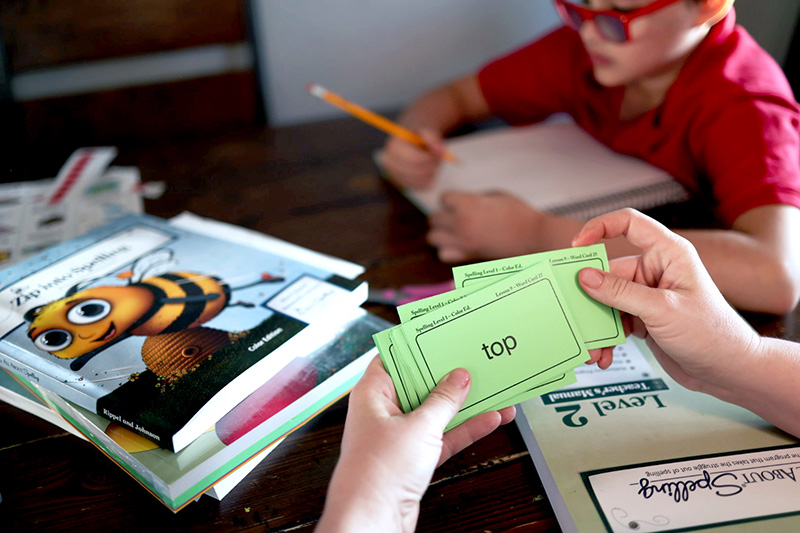
Here are some other Level 1 concepts that older learners may not be familiar with, but that will be a huge help when they get to higher level words:
If you think your older student may be able to skip Level 1, take a look at our All About Spelling Placement Test for help in determining the best placement.
Consider How You Present the Program
To help older kids understand why it’s important to start with Level 1, try comparing learning to spell to something they can relate to, like video games or swimming lessons. Your student may understand that even though the first level of a game (or of swimming lessons) may seem easy, that doesn’t mean he should jump ahead to the fifth level. But it does mean that he can go quickly through the earlier levels, learning what he needs to know so that when he does get to the higher levels, he isn’t overwhelmed by having to learn too much at once.
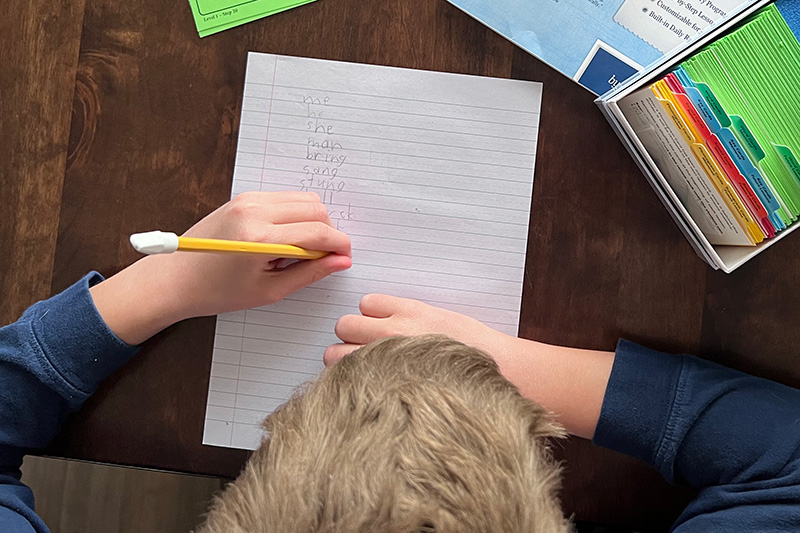
Anna Gillingham, co-founder of the Orton-Gillingham approach, put it this way: “Go as fast as you can, but as slow as you must.”
With older learners, you will probably go much faster than you would with a younger student, but be prepared to slow down if you reach a concept that your student doesn’t understand. Your goal is to achieve mastery.
Have Your Student Teach a Concept Back to You Using Letter Tiles or the Letter Tiles App
When your student can teach a spelling concept back to you, it’s a good sign that he or she has mastered a concept or group of words and is ready to move on. But if your student has to stop and think it through or seems challenged, spend more time on that particular lesson.
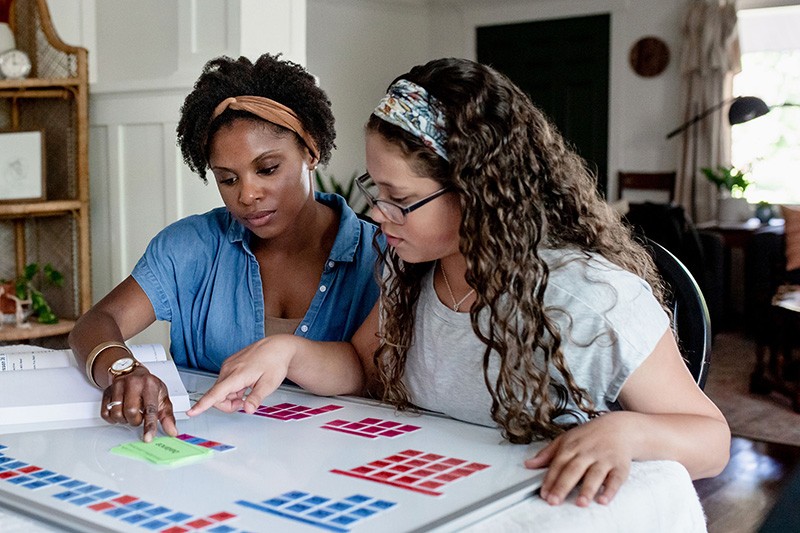
Take Advantage of Advanced Application.
Starting in Lesson 7 of Level 1, Advanced Application sheets are provided especially for older students. These students may already know how to spell small words such as fan and nap, and this section helps them use those words to create longer words, such as fantastic and napkin.
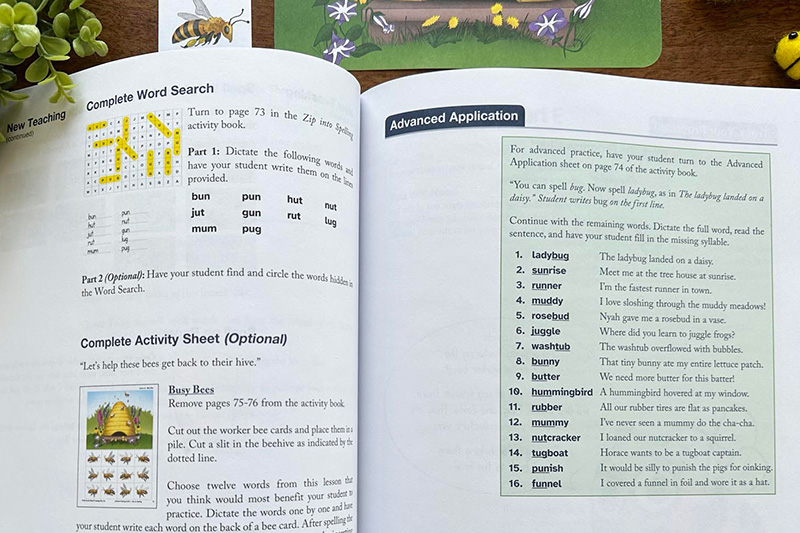
You can see a samples of the Advanced Application sections on our All About Spelling lesson sample page.
Customize the Lessons for Your Student
Older students will need to have the program customized to meet their needs according to their prior spelling knowledge. All About Spelling Color Edition has some built-in features to make this easier for you. In Lessons 1-6, the “Before You Begin” portion of each lesson has a section titled “Can You Skip This Lesson?” to help you decide if your student needs to complete that particular lesson.
Merry Marinello, one of our customer service reps, encountered this situation with her own students. When Merry started using All About Spelling Level 1, her students were in sixth and fourth grades, well past the “typical” age for Level 1.
The PDF below explains how Merry customized the first sixteen lessons of AAS Level 1 for her students. Of course, you may need to use different customizations for your students, but this may give you some ideas as you start out.
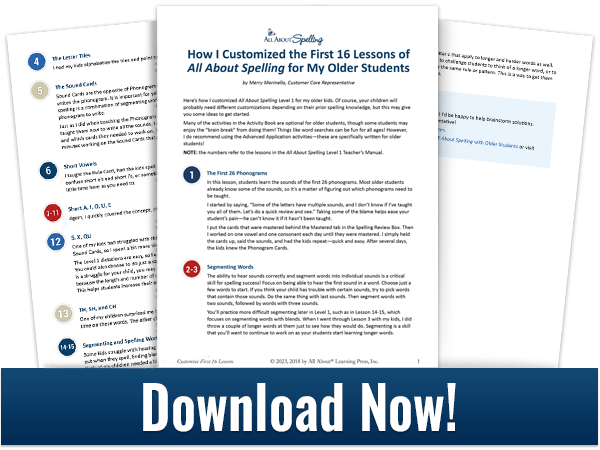
Testimonials from Two Real Moms
Jamie Martin shared a blog post about teaching her teenage son with All About Spelling.
Spelling is important, of course, but never more important than the overall health and well-being of your student! Even with all the hard work we’ve put in, Jonathan is never going to call spelling his favorite subject, nor will it be his strongest one. The way I see it, that’s what spellcheck and dictation are for. 😉
I’ve asked him if, looking back, he wishes that I had pushed him to start earlier. He said, “Sometimes I do, but I think even though it might have made my spelling stronger, it would have made my love of learning weaker. And I don’t think I would be as interested in writing as I am now.”
My biggest advice, no matter what subject you’re covering with your student, is to remember to laugh! Because Jonathan chose to get serious about spelling, he was (almost) always a willing participant, which means we have had some of our best times and biggest laughs during our lessons. (Read more…)
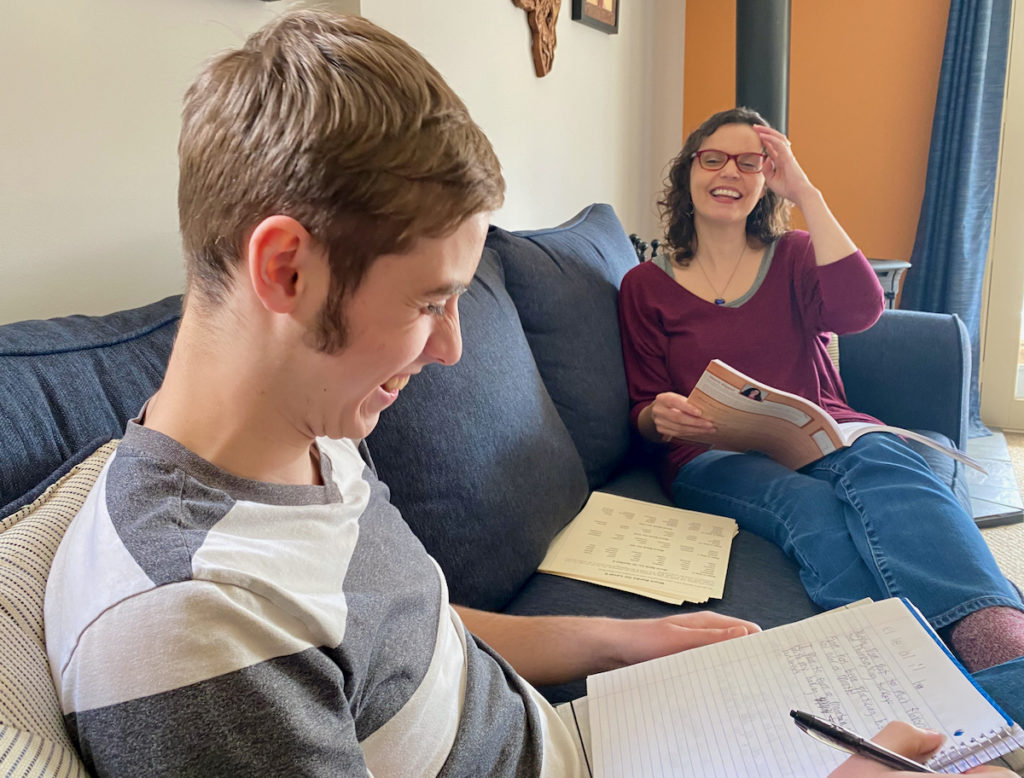
And Bridget shared her son’s inspiring story with us via email…
I am a retired teacher, an instructional coach, and the mother of 4. My youngest son is dyslexic and has struggled with reading and spelling his whole life. He is also a reluctant writer because of his struggles with spelling. He is a smart student, but I couldn’t make sense of what he tried to write.
I was searching for a way to help him and stumbled upon your program online. We made a commitment to see it through. In two weeks we will finish Level 6 of All About Spelling. It has taken us about 7 months to advance through levels 1-6. I am so proud of my son and so thankful for this program. If you could only see where he started and where he is now. I look back at the dictation we were doing seven months ago and the dictation he is able to do now, and I am just amazed. It has taken commitment and hard work from both of us, but the reward is that he can now communicate what is in his mind onto paper.
My son will never be a perfect speller, but I would venture to say he now spells better than many adults. I would highly recommend this program to others who are desperately searching for a way to help their older student. I hope this testimonial will encourage others to take the plunge, be persistent and committed, and see how this program can open doors for your student.
Do you have questions about using All About Spelling with an older student? Post in the comments below, and we’ll be happy to help brainstorm solutions!




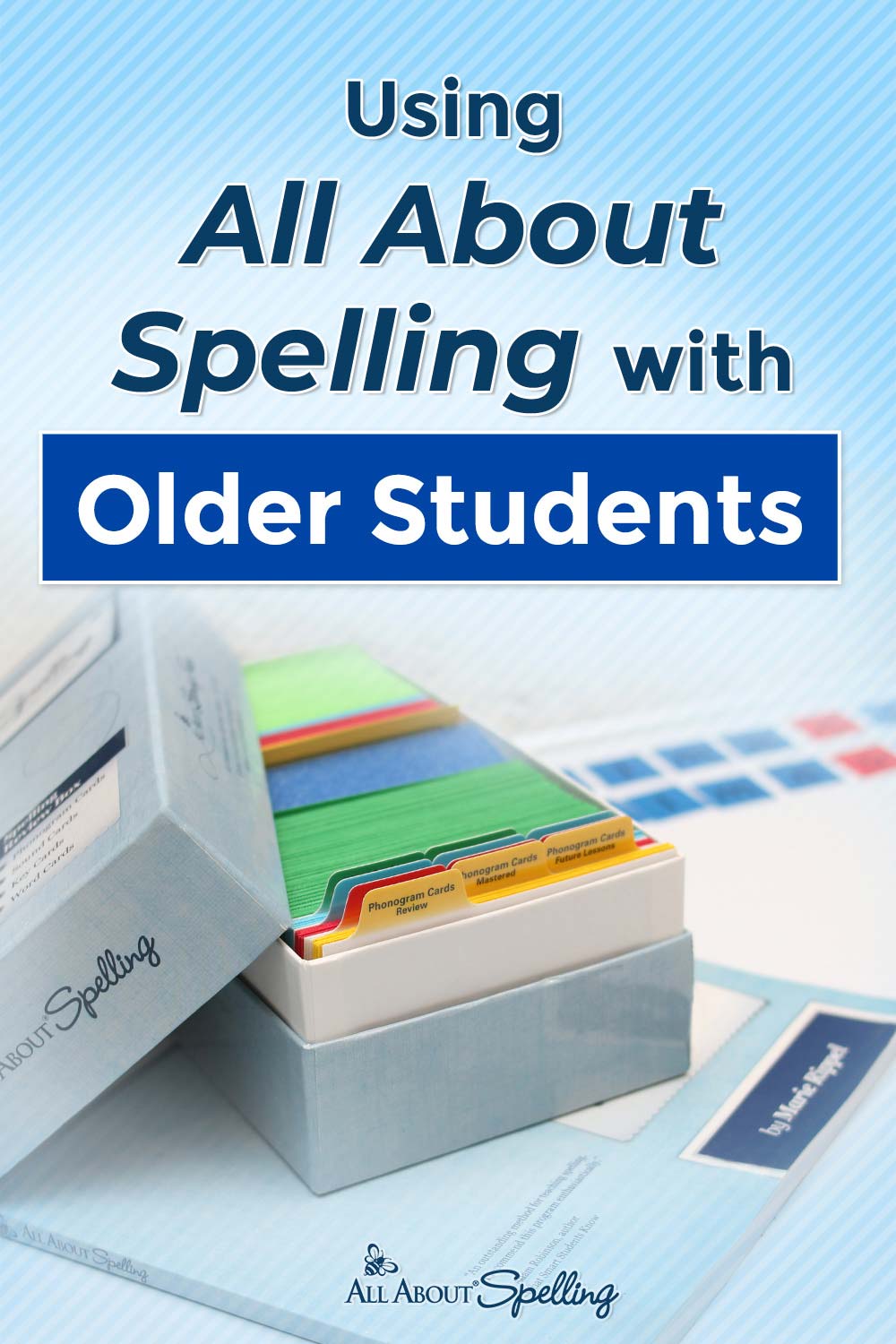






Alice
says:I have been asked to tutor a 3rd grader struggling with reading and spelling. I read that there is a document that discusses using All About Reading and All About Spelling in a tutoring situation. I’d appreciate suggestions on the best way to help him using AAR and AAS. I’ll be tutoring him twice a week.
Robin
says: Customer ServiceAlice,
Email us at support@allaboutlearningpress.com and we’ll happily share the document with tips on tutoring with All About Reading and All About Spelling!
anna
says:We have been using AAS with my son for a few years now. I share the responsibility with my hubby. My son struggles with writing/spelling and reading..I think he is dyslexic.
We are on level 5. However I would not say it’s going well.. We started school this week and started with lesson 21 which was where we left off last year. It isn’t going great. I’m thinking my hubby didn’t follow all the steps in the programs (1-5) and certainly didn’t force mastery…. should we make him start over and this time follow the program completely and demand mastery before moving forward?
Robin
says: Customer ServiceAnna,
I’m sorry your son is struggling!
However, it may not be a lack of mastery along the way that is the cause of what you are seeing. Most students are not ready to just pick up where you left off after a break. They need to spend some time reviewing first. And if the break between the end of last year and the start of this school year was more than a month or so, your son may need at least a couple of weeks, maybe even a month, of review before he is ready to pick up with Lesson 21 again.
Also, Level 5 can be especially hard for some children. Your son may have done fine with Levels 1 through 4, but now needs more on going, focused review to do as well with Level 5. It’s more challenging and complex spelling.
Can you give me examples of the types of errors and difficulties you saw this last week? I may be able to help you narrow down the issues causing his struggles. You can email me at support@allaboutlearningpress.com, or just reply here.
It’s unlikely that he needs to repeat the entire program, but occasionally a student will move ahead too quickly and may need to go back a level or two. I can help you determine that.
Madison
says:I was recommended AAS by a friend. I have a 3rd and 4th grader who both are not very good at spelling but are excellent readers. Should I begin with level 1 for both of them with the AAS? I already purchased levels 3 and 4 thinking it was for the grade without much research on my end (oops) but I am totally fine with purchasing the other levels if they are recommended to do first. Thank you.
Robin
says: Customer ServiceMadison,
Yes, we do recommend that struggling spellers start with Level 1, although occasionally one can start with Level 2. Our spelling placement test will help you determine if your children are among those that can skip Level 1.
The levels and words in the All About Spelling program are arranged by concepts and spelling patterns rather than by grade levels. Though many of the words presented in Level 1 are found on typical 1st-grade lists, other words in the same book can be found on typical 4th-grade lists. The method we use defies normal grade-level classification.
All About Spelling is a building block program with each level built upon the previous one. The rules and concepts learned in Level 1 are applied in Level 2, and then those are applied in Level 3, and so on. Placement for spelling is based on the student’s knowledge of spelling rules and concepts rather than grade level, reading level, or the words a student has memorized.
For example, we find that many students simply memorize easy words like “cat” and “kid” but have no idea why one uses a C and the other uses a K, or that the same rules that apply to these words also apply to higher-level words such as “concentrate.” Other students switch letters or leave out letters entirely. This usually occurs because they don’t know how to hear each sound in the word. Level 1 has specific techniques to solve these problems.
Level 2 of All About Spelling focuses on learning the syllable types, when they are used, and how they affect spelling. This information is foundational for higher levels of spelling. Three syllable rules are introduced in Level 2, and then more in Level 3 and up. For this reason, we don’t recommend starting higher than Level 2.
_____
I hope this clears things up for you! As this blog post talks about, older student that start in Level 1 can fast-track through some of the material. Even if you do all of it fully, older students typically move through the lower levels more quickly, but their spelling is improved even with just Level 1!
Let me know if I can help you with additional questions or anything else. I’m always happy to help!
Leslee
says:I selected All About Spelling as my curriculum choice for both my 4th grader and 6th grader entering a hybrid home school from a rigorous classical Christian private school. I chose it upon recommendation of several people and the fact that it uses the orton gillingham approach (similar to that of their previous school). I went to order the curriculum and had no idea where to start the girls as the levels are not indicative of grade level. Therefore, I had them both take the online placement test and they both landed in level 2. I found it curious that a 4th grader and 6th grader would be the same level. Additionally, each only made two-three mistakes in the entire test. I went back and tested the placement test with perfect scores myself and it still suggested level 2. I went on a google search to find the answer and it appears the highest the placement test puts students is level 2. How do I find the appropriate Level for my daughters if the online placement test defaults to Level 2? Like I said they are both good spellers and know their phonograms well. One was a finalist for the school-wide grades k-12 spelling bee. Please give me any direction as you can as I need to place my order for curriculum ASAP.
Robin
says: Customer ServiceI’m happy to help, Leslee.
All About Spelling is a building block program with each level built upon the previous one. The rules and concepts learned in Level 1 are applied in Level 2, and then those are applied in Level 3, and so on. Placement for spelling is based on the student’s knowledge of spelling rules and concepts rather than grade level, reading level, or the words a student has memorized.
For example, we find that many students simply memorize easy words like “cat” and “kid” but have no idea why one uses a C and the other uses a K, or that the same rules that apply to these words also apply to higher-level words such as “concentrate.” Other students switch letters or leave out letters entirely. This usually occurs because they don’t know how to hear each sound in the word. Level 1 has specific techniques to solve these problems.
Level 2 of All About Spelling focuses on learning the syllable types, when they are used, and how they affect spelling. This information is foundational for higher levels of spelling. Three syllable rules are introduced in Level 2, and then more in Level 3 and up. For this reason, we generally don’t recommend starting higher than Level 2.
However, the exception to the “generally” recommendation is those students who have previous experience with Orton-Gillingham-based instruction. I’m happy to help you determine which level will be best for your students considering their previous learning. Please email me at support@allaboutlearningpress.com. Or, if you prefer, let me know that you would like me to email you.
Kitty
says:I think this is exactly what I have been looking for. My 10 year old is a couple of grade levels ahead in reading, pretty much picked it up on her own and hit the ground running. And while she does well sounding out words to spell, obviously that doesn’t work for every word so she will ask “Alexa” or “Siri” how to spell the word. I am eager to see if this helps her with words that aren’t spelled the way they sound.
Robin
says: Customer ServiceKitty,
My daughter was 10 when I found All About Spelling many years ago, and it made a world of difference in her spelling ability!
Let me know if you need help with placement for your son or have questions of any sort. I’m always happy to help!
Christie
says:Hi! I’m hoping someone sees this and can help. I’ve perused all the comments and replies here (SO helpful!), but didn’t see this one, so hopefully I’m not repeating one you get all the time.
I am about to start this with my 15 year old son, who we are pretty convinced has dyslexia. I feel badly for not being more targeted with his spelling earlier (especially since I taught middle and high school English back in the day!), but here we are…. He’s not terribly interested in academic work (outside of history), but he LOVES reading (he read over 250 books last year on his own and loved tracking them), and he seems to retain info incredibly well for subjects he cares about.
…But enough background info. ;)
I was wondering if this can be done without the activity sheets. I probably overlooked something, but I couldn’t tell if one has to use those or if just the letter tiles and teacher’s manual stuff will work. The activity sheets I saw definitely don’t look like anything that would interest my son, and in fact look like he’d be embarrassed by them, so I wanted to find out.
Thanks so much!
Christie
says:THANK YOU!! (And thanks for overlooking my poorly written sentences – oy. I didn’t even notice them as I was typing, then couldn’t edit. ;) )
And the non-color edition neglect was totally on me; I completely forgot to mention that. Thanks for your grace and your thorough responses; they are much appreciated. I am truly impressed with the level of customer service I’ve seen with you guys – thank you!!
Robin
says: Customer ServiceYou’re welcome, Christie! Let me know if I can help with anything else.
Robin
says: Customer ServiceI’m happy to help, Christie!
You absolutely do not have to do the activities with older students! There are there to provide fun ways to review for those students who will enjoy and be motivated by such work.
However, you will still need the Activity Book for your son, as there are other things in it that will be very help to his mastery spelling. For example, the Advanced Application pages show older students how the simple concepts they are learning in the lower levels apply directly to higher level words. The Word Banks will also be necessary, as they help students group words that use the same spelling pattern together in their minds, forming schemas that are necessary for good memory. Our article on How Making Connections Helps Your Child’s Memory explains schemas.
You can look through our Sample Lessons and see that the Advanced Application and Word Bank pages are simpler, and not as likely to be embarrassing to an older student.
The Rule Posters are really helpful for students, but I agree that these may be young for some teens. You do not have to use these, but if you do not, I recommend encouraging your son to make his own rule sheet or something where he writes the information from the poster down for easy reference. You don’t have to show him the poster; he can use the Rule Card and then you can have him add the extra helps or sample words that the Rule Poster has.
I hope this helps, but let me know if you have additional questions.
Christie
says:Thanks for the quick reply. I should thought to mention that I have the older, non-color versions of all the teacher’s manuals and such, and my next step is to get the app, I think he’ll like that better than the letter tiles we have, plus we are moving overseas, so it sounds easier to do that!
Sorry for all the questions, but could you help me clarify this? As I continued researching using this with an older student, I thought I read that the activity books were only for the color version, but now I’m thinking I misunderstood that.
But on the topics of older students, activity books and luggage space, we have limited luggage space for our overseas assignment, and buying a stack of workbooks that he would only use some pages from seems a bit wasteful for both our limited space and materials. Do you sell anything, maybe downloadable printables or something, that is more geared for older students and cuts out the unnecessary and more child-like pages?
Robin
says: Customer ServiceChristie,
I’m sorry for the confusion. I responded to your initial question thinking you didn’t yet own All About Spelling, so you would be purchasing the Color Edition. The Activity Books are required for it, as some pieces aren’t available elsewhere.
However, the First Edition of All About Spelling (the black-and-white edition) did not include an activity book. It was just the Teacher’s Manual, the flashcards, and some additional pieces such as the word banks for each level (Levels 2 through 7) printed on cream colored cardstock. If you have all the pieces, then yes, the program can be done with out the Activity Books; that is how it was designed with that edition.
If you do not have all the additional pieces, such as the “Silent E booklet” for Level 3, I highly recommend you purchased them now even if your student won’t be getting to those levels until much later. We will not be reprinting the First Edition materials, and will only have such things in stock while supplies last. We are already out of stock of the Level 3 flashcards, for example, although we do still have the Silent E Book available. You can email me at support@allaboutlearningpress.com to order such pieces.
Elissa Schibley
says:Thank you for this post, it was so helpful in reassuring my 4th grader that it was ok for him to start with level 1!
Robin
says: Customer ServiceElissa,
I’m pleased to hear that this blog post was helpful for your 4th grader! You can let him know that my daughter was near the end of 4th grade when she started Level 1, and now she is a fabulous speller (and a school teacher)!
Shannon Younkin
says:I am very interested in purchasing this program for my daughter. She is 10 (almost 11) and will be going into 6th grade next school year. I was wondering how many more levels I should purchase with level 1 at this time in order to progress her to a level that would be more in line with middle school expectations? I realize this is not grade level based but wanted to have an idea of how many levels it would take to help her feel more confident and on track with middle school expectations.
Robin
says: Customer ServiceShannon,
It is a good idea to purchase more than one level at once, as older students like your daughter will go through the first couple of levels more quickly.
Our levels not being grade level based means that I can’t point to a specific level that will be sure to have your daughter able to spell all middle-school words easier. The levels and word lists in the All About Spelling program are arranged by concepts and spelling patterns rather than by grade levels. The method we use defies normal grade-level classification.
For example, another spelling program lists the words cross, off, and plant on their 4th-grade list, but these words can easily be spelled by a child completing the Level 1 book. That same program includes the words school and yellow on its 1st-grade list, but expecting kids to spell words like those before mastering more basic syllable types undermines their future spelling ability.
All About Spelling groups words logically based on similar rules or spelling patterns regardless of their supposed grade level, which allows students to progress quickly and confidently. All About Spelling Level 7 takes students up through high school level spelling. The program teaches all of the words on the Ayres list (except a few which aren’t in common use anymore), which ranks words up to 12th grade, as well as words from other lists that are ranked between 9th and 12th grade.
So, instead of what level she needs to be at great level next year, consider just purchasing Levels 1, 2, and 3 at this time. These are the only levels currently available in the Color Edition, but Level 4 is due to be released in the Color Edition this summer. Also, even with the fast-tracking and such as suggested in this blog post, the first three levels will take even older students about half a year, or longer if they struggle with spelling.
Even just working through Level 1, however, will help her spelling even of higher level words. The foundational skills and concepts learned in Level 1 apply to all words.
I hope this helps, but let me know what additional questions you have.
Sarah
says:I just ordered this program and we are loving it! However, I ordered from the Canadian distributor and received the older black and white version. That’s fine, but it doesn’t include the Advanced Application spelling lists and I’m using the program with my 10 and 11 year old starting in level 1. I find myself wishing those advanced lists for each level were available somewhere?
Robin
says: Customer ServiceSarah,
I’m sorry, no. The Advanced Application activities are only available in our Color Edition materials.
However, if you check the samples of the Color Edition Level 1 in Lesson 11, you can see how the Advanced Application activities work, and can use that to make your own.
I hope this helps some.
Nanu Kelley
says:I am a grandma to a struggling 9 year old speller, how much does this cost?
Robin
says: Customer ServiceNanu,
You can purchase our materials and find the pricing on our website here.
Let me know if you have questions about placement or need anything else. I’m happy to help!
R. Turner
says:My 10 year bulked at first because she thought she didn’t need to start at the same level as her 7 yr old brother and 4 yr old sister. But once giving it a try she realized how easy it was. It really was a confidence booster she needed to get better at spelling and sounding out words when she was reading.
Robin
says: Customer ServiceThank you for sharing this! It’s great to hear how your 10-year-old has done with All About Spelling Level 1.
Rachel
says:I’ve found this resource and blog tips so helpful with an older learner for a lower level.
Robin
says: Customer ServiceGreat that this was helpful, Rachel! Let us know if you have questions or need anything.
Amanda
says:This is great info!! Thanks for the tips and the download. I am doing AAS with one of my sons and was wondering how to bring the other older kids on board. Thanks again!
Robin
says: Customer ServiceI’m glad this is helpful, Amanda! However, if you have additional questions or need anything, just ask. We’re happy to help!
Katie Schulte
says:Our kids have done very well with AAR! About to start level 4 this school year!
Robin
says: Customer ServiceWonderful to hear, Katie! Thank you.
Raquel
says:This is so helpful!
Robin
says: Customer ServiceI’m glad this is helpful, Raquel!
Dell
says:Sounds like something my 11 yr old niece needs. She doesn’t even know the sound of all the letters.
Robin
says: Customer ServiceDell,
It does sound like your niece would benefit from All About Spelling!
Hayley
says:We started AAS with my 9 year old. It has been very valuable.
Robin
says: Customer ServiceGreat to hear, Hayley! Thank you.
Kerrian
says:Sounds like a great resource!
Robin
says: Customer ServiceThank you, Kerrian!
Kandice
says:Thanks for the helpful information. The placement test will be very helpful.
Robin
says: Customer ServiceYou’re welcome, Kandice. Yes, the placement test is helpful.
Angelina
says:OMG! I just came across this blog due to the reading academy I am participating. I was a bit nervous teaching 8th-grade students cause it would be my first year teaching this grade level, and I was worried about how to help students who may be below their reading level. I am saving your browser for future reference.
Robin
says: Customer ServiceI’m glad you have found our blog articles helpful, Angelina! If you have questions or specific concerns, we’re happy to help.
David
says:I like it.
Robin
says: Customer ServiceThank you, David.
Stephanie
says:Thank you for helping us late starters.
Robin
says: Customer ServiceYou’re welcome, Stephanie. I first found All About Spelling when my daughter was 10 and struggling to spell even beginning words. It made a world of difference for her!
Please let me know if you have questions or need anything. I’m happy to help!
Karen
says:My son has intellectual disabilities and speech delays. Level 1 AAS has helped him not only with spelling but also with speech. He has trouble spelling verbally but can use the letter tiles to spell the word so we love the manipulatives. This level will work for him for many years because of it’s adaptability.
Robin
says: Customer ServiceI’m so glad that All About Spelling is working out well for your son, Karen! Thank you!
Mandie
says:I love the idea of having my kid teach the concept back to me!
Robin
says: Customer ServiceMandie,
Oh, yes! Having a student teach a concept is such an effective review technique! You have to really know and understand something to be able to explain it so someone else.
Anh
says:This comment for test
David
says:I like it
Robin
says: Customer ServiceThanks, David.
Esty
says:Thank you for this article and for all the free sheets. I’m hoping to purchase the spelling program
Robin
says: Customer ServiceYou’re welcome, Esty! Let me know if you have questions about placement or need any other information. I’m happy to help!
Holly
says:I have been tutoring my 3rd grade grandson (read: teaching him to read!) with AAR since 1st grade. He’s on level 3 now.
I’ve dragged my feet to start Spelling (I have Level 1 in hand) because 1) he had a hard time catching on to Reading (but he has!!!) and 2) it just doesn’t look as fun/enticing (for either of us :) as AAR. The Step 1-16 revisions, which I found today, are Most helpful. I have yet to begin AAS.
I still have one tripping point: I haven’t been able to bring myself to teach the phonogram cards with multiple sounds as presented. It seems he would be learning by rote with no obvious/immediate application. (My grandson has ADHD and dyslexia so immediate need/use is extra helpful.) Can you suggest an alternative and/or give me a pep talk for teaching the phonograms the given way? I don’t want to dig him into a hole he/ we will keep falling into.
Ok, a second tripping point: do the new versions of levels 1-2 give ways to make the lessons, well, more fun? AAR has been Right up our alley; we both enjoy it and my grandson responds to it well.
Thank You for being available for coaching! This is an invaluable part of the program!! —Holly
Robin
says: Customer ServiceHolly,
I understand your concerns about teaching all of the sounds of each letter and phonogram. However, there is good reason for learning all the sounds of letters by the end of All About Reading Level 1.
Here’s why Marie Rippel (the author and creator of All About Reading and All About Spelling) teaches all of the sounds of a letter at once:
One thing to remember, all the letters and their sounds are not taught at once. All About Spelling Level 1 Lesson 1 instructs you to work on just four letters at a time. There are games and activities to help with reviewing the letter sounds in more multisensory ways.
Knowing all the sounds of letters ahead of time will give your student a view into what learning is coming up in the future. Also, learning the long sound of all the vowels AND learning to spell words with those long sounds all at the same time can be overwhelming. It is best for a child to know the long sounds (second sounds) of all the vowels well before reaching the spelling lesson that teaches him to use those sounds in words. As for the additional sounds, learning to read or spell words with a vowel’s third (or fourth) sound will be easier if the student is already aware that the vowel has a third (or fourth) sound.
As for the new Color Edition All About Spelling having more help for making the lessons more fun, the answer is yes! These new materials are full of games and activities to make mastering spelling more interactive and enjoyable. Check out the sample materials to get an idea of how this is done.
I hope this helps, but please let me know if you have additional questions or concerns. I’m happy to help as much as you need!
Julie
says:I’m brand new to this program (it was recommended to me on a homeschool FB page I follow), and I have a question. We live overseas and I just have one opportunity a year to order curriculum from the States. My child is going into 3rd grade in the fall and definitely needs spelling help (his reading is very good). Would you recommend I purchase levels 1 and 2 for the year? Or how many levels would you recommend? I want to make sure I have what I need so that I don’t have to wait another year to purchase. Thank you!
Robin
says: Customer ServiceJulie,
Good question. You will definitely need Levels 1 and 2, but there is a good chance that you may need Level 3 as well. It isn’t as likely that your student will finish all of Levels 1, 2, and 3 in one year, but I think it is likely that he will at least need to start Level 3 before you can get your next order.
Summer
says:My 3rd, 7th and 8th graders are in level 1 together. My 5 year old sits in too, although he can’t read yet. I know we are way behind on spelling. I thought they would eventually just get it without a specific program, but they never got as good at spelling as I wanted. Your article has encouraged me to keep going.